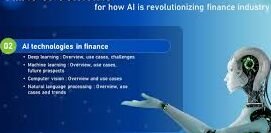Artificial Intelligence (AI) is transforming the finance industry at an unprecedented pace, ushering in a new era of efficiency, innovation, and customer-centric services. This article explores the profound impact of AI across various sectors within finance, highlighting key advancements, applications, and implications for businesses and consumers alike. Here are 16 key ways AI is revolutionizing finance.
AI-Powered Fraud Detection and Prevention
AI algorithms have revolutionized fraud detection and prevention in banking and finance. Machine learning models analyze vast amounts of transaction data in real-time to identify patterns indicative of fraudulent activity. By detecting anomalies and unusual behaviors, AI systems can flag suspicious transactions promptly, minimizing financial losses and enhancing security for customers and institutions. AI algorithms are significantly enhancing fraud detection and prevention. By analyzing transaction patterns and identifying anomalies, AI systems can detect fraudulent activities in real-time, minimizing losses and improving security.
Algorithmic Trading and Financial Forecasting
AI-driven algorithmic trading strategies leverage machine learning algorithms to analyze market trends, historical data, and news sentiment in milliseconds. These algorithms execute trades autonomously based on predictive analytics, optimizing investment decisions and capitalizing on market opportunities. AI also enhances financial forecasting accuracy by analyzing economic indicators and predicting asset price movements with greater precision.
Personalized Banking Services
AI enables personalized banking experiences tailored to individual customer preferences and behaviors. Chatbots powered by natural language processing (NLP) provide instant customer support, answer inquiries, and offer personalized financial advice. Recommendation systems analyze transaction histories to suggest relevant products and services, enhancing customer engagement and satisfaction. AI-powered sentiment analysis tools analyze social media, news, and other text sources to gauge public sentiment towards financial markets, companies, and products. This information helps investors and financial institutions make informed decisions based on market sentiment and trends.
Credit Scoring and Risk Assessment
AI algorithms enhance credit scoring and risk assessment processes by analyzing diverse data sources beyond traditional credit bureau data. Machine learning models evaluate alternative data points such as social media behavior, transaction patterns, and employment history to assess creditworthiness accurately. This approach expands access to credit for underserved populations while mitigating risks for lenders. AI is driving process automation in finance, reducing manual effort and increasing efficiency. Robotic process automation (RPA) automates repetitive tasks like data entry, transaction processing, and report generation, allowing financial professionals to focus on higher-value activities.
Robo-Advisors and Wealth Management
Robo-advisors powered by AI algorithms automate investment portfolio management and wealth advisory services. These platforms use machine learning to analyze investor profiles, financial goals, and market conditions to recommend personalized investment strategies. Robo-advisors offer cost-effective solutions, diversify portfolios, and optimize asset allocation, democratizing wealth management for retail investors. AI strengthens security measures by detecting and responding to cybersecurity threats. Machine learning models analyze network traffic, user behavior, and access patterns to identify anomalies and potential security breaches, protecting sensitive financial data and maintaining system integrity.
Risk Management and Regulatory Compliance
AI enhances risk management practices by identifying potential risks, assessing their impact, and recommending mitigation strategies in real-time. Natural language processing (NLP) tools automate regulatory compliance monitoring by analyzing legal documents and regulatory changes, ensuring financial institutions adhere to evolving compliance standards and avoid penalties. Machine learning models continuously adapt to new fraud tactics, ensuring robust protection.
Customer Relationship Management (CRM)
AI-powered CRM systems in finance analyze customer interactions, transaction histories, and social media data to improve relationship management. Predictive analytics anticipate customer needs, personalize marketing campaigns, and enhance cross-selling opportunities. AI-driven CRM platforms foster customer loyalty, increase retention rates, and drive revenue growth through targeted customer engagement strategies.
Automated Underwriting and Loan Processing
AI streamlines underwriting and loan processing workflows by automating document verification, risk assessment, and credit scoring processes. Machine learning models analyze borrower profiles and financial data to expedite loan approvals while minimizing manual intervention. Automated underwriting enhances efficiency, reduces processing times, and improves loan decision accuracy for lenders and borrowers.
Regulatory Technology (Reg Tech)
Reg Tech solutions leverage AI to streamline regulatory compliance processes, monitor financial transactions for suspicious activities, and facilitate reporting requirements. AI algorithms enhance fraud detection, anti-money laundering (AML) efforts, and Know Your Customer (KYC) procedures, enabling financial institutions to navigate complex regulatory landscapes efficiently and cost-effectively. AI is enabling personalized financial services by analyzing customer data and behaviors. Financial institutions can offer tailored advice, products, and services that meet individual needs and preferences.
Quantitative Analysis and Portfolio Optimization
AI-driven quantitative analysis tools enhance investment strategies by analyzing historical data, market trends, and economic indicators. Machine learning algorithms optimize portfolio allocation, rebalance asset weights, and predict market fluctuations to maximize returns while minimizing risks. AI-powered portfolio optimization tools provide actionable insights and decision support for asset managers and investors.
Real-Time Market Intelligence and Sentiment Analysis
AI tools provide real-time market intelligence by analyzing news articles, social media posts, and financial reports to gauge market sentiment and investor behavior. Natural language processing (NLP) algorithms extract actionable insights, identify emerging trends, and predict market reactions to news events. Real-time sentiment analysis enhances decision-making and trading strategies in volatile market conditions. This personalization improves customer satisfaction and loyalty while driving business growth.
Cybersecurity and Fraud Prevention
AI strengthens cybersecurity defenses in finance by detecting and mitigating cyber threats, unauthorized access attempts, and data breaches in real-time. Machine learning models analyze network traffic patterns, identify anomalies, and preemptively respond to security incidents. AI-driven cybersecurity solutions protect sensitive financial data, safeguard digital transactions, and uphold trust in digital banking services.
AI in Insurance Underwriting and Claims Processing
In the insurance sector, AI enhances underwriting accuracy by analyzing policyholder data, claims histories, and risk factors. Machine learning algorithms automate claims processing, assess claim validity, and expedite settlements while detecting fraudulent claims. AI-powered insurance solutions improve operational efficiency, reduce administrative costs, and enhance customer satisfaction through faster claims resolution. These algorithms can process vast amounts of information faster than humans, making split-second decisions that maximize profits and minimize risks in volatile markets.
Chatbots and Virtual Assistants
AI-powered chatbots and virtual assistants in finance provide personalized customer support, answer inquiries, and assist with account management tasks. Natural language processing (NLP) enables chatbots to understand and respond to customer queries in real-time, enhancing service delivery and accessibility. Chatbots streamline customer interactions, reduce wait times, and improve overall customer experience.
AI in Anti-Financial Crime (AFC) Strategies
AI technologies bolster anti-financial crime strategies by analyzing transactional data, monitoring suspicious activities, and identifying potential money laundering risks. Machine learning algorithms detect complex fraud patterns, improve transaction monitoring accuracy, and enable proactive risk management. AI-driven AFC solutions enhance compliance efforts, mitigate financial crime risks, and uphold regulatory integrity. Algorithmic trading uses AI to execute trades at optimal times by analyzing market data and predicting price movements.
Ethical and Regulatory Considerations
As AI adoption in finance expands, ethical considerations regarding data privacy, transparency, bias mitigation, and regulatory compliance become paramount. Financial institutions must implement robust AI governance frameworks, adhere to ethical guidelines, and collaborate with regulators to ensure responsible AI deployment. Upholding trust and accountability in AI-driven financial services is essential for maintaining consumer confidence and regulatory adherence.
Artificial Intelligence is revolutionizing the finance industry by optimizing operations, enhancing decision-making processes, and delivering personalized customer experiences. From AI-powered fraud detection and algorithmic trading to robo-advisors and regulatory compliance, AI technologies are reshaping financial services and driving digital transformation. Embracing AI-driven innovations strategically and responsibly will empower financial institutions to innovate, mitigate risks, and capitalize on emerging opportunities in an increasingly competitive global market. As AI continues to evolve, collaboration between industry stakeholders, regulators, and technology innovators will be essential to harnessing its full potential for sustainable growth and financial inclusion.







